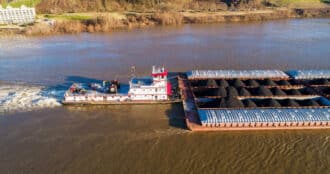The Rev. Dr. Leah D. Schade
Faith leaders in Louisiana’s “Cancer Alley” show what it takes to stand against polluting industries by fighting for environmental justice.
Here are ideas for reading and preaching Jeremiah 20:7-13, a prophet’s lament in the face of derision, and Matthew 10:24-39, Jesus’s teaching about facing persecution. This is part of the EcoPreacher 1-2-3 series to equip preachers and congregations for engaging the Bible through an ecological lens. These texts are assigned as part of the Revised Common Lectionary for the Fourth Sunday after Pentecost, Year A.
Eco-Exegesis
Eco-exegesis is a method of interpreting the biblical text through a green lens using the principles of ecological theology.
Jeremiah 20:8
For whenever I speak, I must cry out, I must shout, ‘Violence and destruction!’
For the word of the Lord has become for me a reproach and derision all day long.
When God calls a prophet to bring attention to the corrupt and destructive practices of a people and their leaders, that person rarely finds a receptive audience. More often, they become a target for ridicule, accusations, shunning, and even violence. This was the case with the prophet Jeremiah. From a young age, he answered God’s call to announce the consequences of Israelites’ unfaithfulness to the covenant. In this passage, Jeremiah does not mince words about his anger and frustration over the fact that no one will listen to him and that even his friends wish for his failure. Yet, he cannot turn away from his mission. Even if he tried to stay silent, the warning from God for his people would become “like a burning fire” within him (v. 9). However, this poem of lament concludes with surprising words of faith and praise: “Sing to the Lord; praise the Lord! For he has delivered the life of the needy from the hands of evildoers” (v. 13).
Today, those fighting for environmental justice are often derided, attacked, or silenced for disrupting the systems that cause suffering to both Earth kin and human communities. It is not happy news that we share. Rather, our message echoes Jeremiah’s words of “violence and destruction” (v. 8). For example, two faith leaders in the U.S. state of Louisiana have been sounding the alarm about the poisoning and toxification of communities in what’s known as “Cancer Alley,” an 85-mile industrial corridor along the Mississippi River. Deacon Joseph M. Clavijo and Rev. Gregory Manning have publicly opposed plans for plastics and chemical plants and have been arrested for their protests.
Yet they have not given up. In fact, they have created an interfaith coalition that also connects with Indigenous groups to protect fragile ecosystems and vulnerable human communities. One of their partners is David Shepard, chair of the environmental action committee at Touro Synagogue in New Orleans. Says Shepard, “Given the ways in which Jewish communities have been marginalized historically, (we) identify and partner with and lift up other communities that are marginalized,” he said. “It resonates with the Jewish community. It’s our role to partner with and support those other communities, as well,” (“Faith leaders join forces to address environmental justice issues in Louisiana,” Diana Leane, Medill Reports, June 8, 2022).
Matthew 10:26-27 ‘So have no fear of them; for nothing is covered up that will not be uncovered, and nothing secret that will not become known. 27What I say to you in the dark, tell in the light; and what you hear whispered, proclaim from the rooftops.
One of our jobs as the church is to amplify the voices of those who have only been able to whisper their pain. This includes those who live in the shadow of industrial pollution and environmental racism. Some churches in Louisiana’s Cancer Alley are making their voices heard about the ways in which polluting industrial plants manipulated zoning policies that have harmed their communities. Black residents of St. James Parish, including members of St. Michael Catholic Church and Mt. Triumph Baptist Church, have filed a lawsuit in U.S. District Court in New Orleans calling for a moratorium on chemical plants that they allege have been intentionally sited in Black neighborhoods. They are fighting for environmental justice.
According to an article by James Bruggers in Inside Climate News, parishioners from the churches, along with members of community organizing groups, have been ignored and dismissed by their local leaders. But, says Shamyra Laigne with RISE St. James, “We will not be ignored. We will not sacrifice our lives.”
Added Barbara Washington, co-founder and co-director of the faith-based group Inclusive Louisiana, “This is the day that the Lord has made, and we shall rejoice and be glad therein because we smell victory. Every one of us has been touched by the [leaders’] decisions to expose us to toxic plants. We all have stories about our own health and the health of our friends. It’s time to stop packing our neighborhoods with plants that produce toxic chemicals.” (“Citing ‘Racial Cleansing,’ Louisiana ‘Cancer Alley’ Residents Sue Over Zoning,” James Bruggers, Inside Climate News, March 21, 2023).
Jesus’s words in Matthew 10:24-39 speak to the struggle that often accompanies the commitment to do justice. Like Jeremiah, and like Jesus himself, activists who work to bring justice may find themselves at odds with family members, friends, co-workers, and government leaders. Yet there is also a solidarity to be found, and even a kind of kinship with those who lock arms with us in advocacy and non-violent resistance to oppression. Jesus assures his followers that toxic secrets will eventually become known and the work for justice will be vindicated. But it often requires sacrifice and always demands the highest commitment to ethics and integrity.
1. Eco-Idea
The Eco-Idea is one succinct statement that tells us who God is and/or what God does in relation to Creation and how we should respond as people of faith.
Even when they face mockery, ignorance, arrest, and persecution, the power of God accompanies and empowers those who are fighting for environmental justice.
2. Eco-Questions
Eco-Questions are what we can ask to help a congregation draw out the implications of the Eco-Exegesis and Eco-Idea.
- What are the stories about environmental suffering in our community that are only being told in whispers? How might your congregation stand in solidarity with them to listen and then “proclaim from the rooftops”?
- Who are the environmental advocates and activists in your area that need support? In what ways can your congregation show up for them to let them know they are not alone as they are doing essential work? And that they can count on people of faith to have their back when they are facing down powerful entities?
3. Eco-Actions
Eco-Actions are ways that a congregation might respond to the Eco-Idea and Eco-Questions. One of these possibilities may have salience for your ministry context.
- Invite individuals or families who have suffered from environmental racism, water pollution, poor air quality, or climate-driven natural disasters to speak at your church. Listen to their stories and ask how your congregation can be helpful and supportive. Do they need resources for legal challenges? Clean water? People to write letters on their behalf?
- Invite environmental activists who are on the front lines of advocating for justice to speak at your church. Listen to their stories and ask how your congregation can be helpful and supportive. Do they need volunteers to call legislators? People to show up at peaceful demonstrations? Donations for protecting a threatened habitat or community?
- Look for stories from news sources that are covering climate and environmental issues and share them with fellow church members, friends, and family. Visit Inside Climate News and sign up to receive their informative and inspiring stories.
*Featured image source





